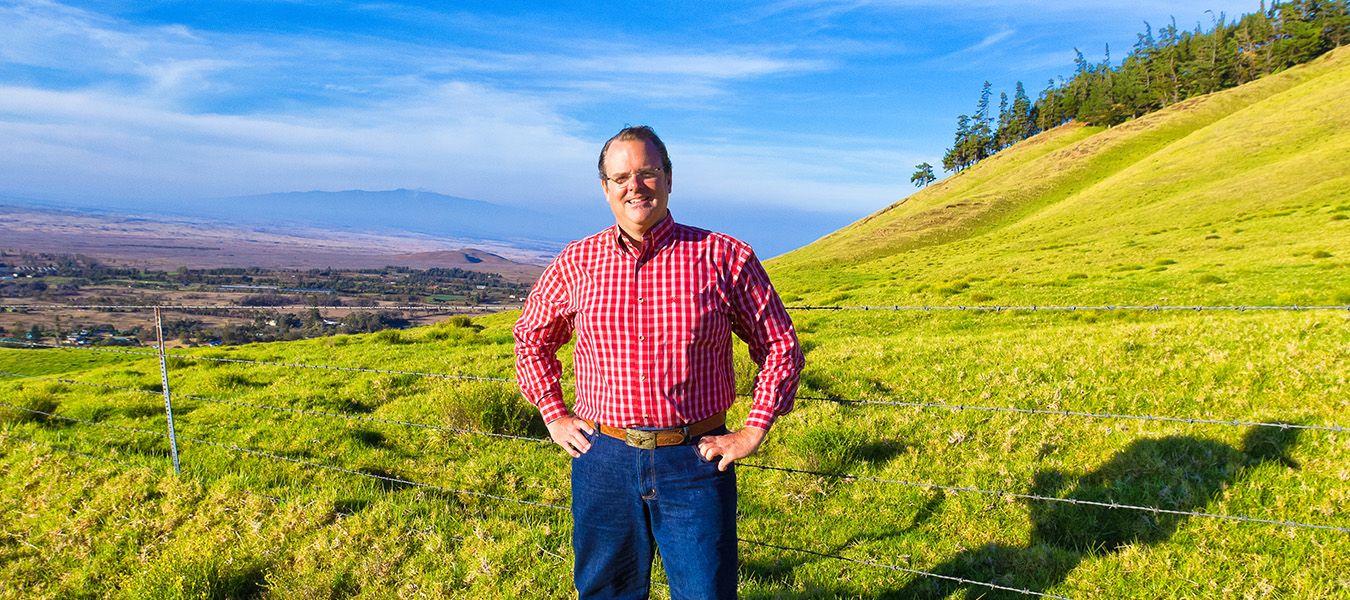
T'92
Neil “Dutch” Kuyper
President & CEO, Parker Ranch, Inc.
Sustainability is not just a nice idea. We believe it now offers profits.
Neil “Dutch” Kuyper T’92 has worked in Boston, New York, and Hong Kong, but few offices compare to the one he recently moved into. In a historic 19th-century ranch house on the Big Island of Hawaii, he looks out over pastures so lush they virtually glow, fertile volcanic hills, grazing horses, and, in the distance, 13,796-foot Mauna Kea, occasionally dusted with snow. The view is just one of the perks that comes with Kuyper’s new role as president and CEO of Parker Ranch, a 130,000-acre cattle operation and piece of Hawaiian history. Kuyper’s experience, connection to the islands, and passion for sustainability made him an obvious choice for the community-focused business, which hired him in late January.
Born on Oahu, Kuyper had longed to return after serving as chief operating officer for Capricorn Investment Group and, previously, managing member of Morgan Creek Capital Management. After nearly 28 years away, and crossing paths with investors like Julian Robertson who seeded Morgan Creek, he decided the time was right for a change and returned with his wife and four children. “The irony was we had chosen the lifestyle and the life of the Big Island and Waimea before we ever knew that the opportunity would exist for me to be CEO of the ranch,” said Kuyper. “It’s kind of a lesson in taking a leap of faith.”
Thirteen generations after its founding in 1847 by an adventurous sailor, the ranch is the second-largest landowner in Hawaii and the one of the largest cow-calf operations in the United States, producing some 10 million pounds of beef each year. It is also the guardian of the living paniolo culture—generations later, Hawaiian cowboys still trot these hills—and, in the last 20 years, an important source of income for the Waimea community. When the founder’s last descendant, Richard Smart, died in 1992, he made a bold, forward-thinking move to support the community in perpetuity: He left Parker Ranch in a trust to benefit two local schools, a hospital, and a community foundation. As President and CEO, Kuyper supports the ranch’s legacy but also capitalizes on new opportunities, particularly in sustainability.
“Hawaii is probably one of the best places to study the feasibility of sustainability strategies,” says Kuyper. “Because the cost of energy is so high, the attractiveness of alternatives is that much higher. The chance to study the integration of geothermal, wind, and solar with development and land stewardship is fascinating.” Kuyper has numerous plans to establish Parker Ranch as a leader in sustainability on an island that once grew all of its own food but now imports nearly 90 percent of it. “Sustainability is not just a nice idea. We believe it now offers profits.”
First, Kuyper plans to transition much of the ranch’s beef production back to the island. (Cattle are currently flown to the mainland to be finished, a practice that sprang from low fuel prices decades ago.) Now, as oil and corn prices become increasingly volatile and the market for local, grass-fed beef grows, it makes both business and environmental sense to keep the cattle on the ranch and process and sell the meat locally. With nearly 75 percent of its revenues coming from U.S. mainland operations, “We’re a mainland ranch with a presence in Hawaii. We believe a more sustainable and profitable business model is to refocus on Hawaii,” says Kuyper.
Already the ranch produces enough power through a wind-solar system to operate its own water system, but Kuyper has three wind and solar projects in the works that could come on line in the next two years. He successfully petitioned the state land-use commission to protect 57,000 acres as important agricultural land. Kuyper believes the nexus of food, energy, water and forests is the future.
Kuyper credits Tuck with distilling his value of community, but there’s another classic Tuck value that Kuyper says helped lead him to Hawaii: work hard, play hard. Come weekends, Kuyper swims Mauna Kea Beach, a famed palm-fringed stretch of white sand bought by the Rockefellers from Parker Ranch, and occasionally saddles up a horse and rides with his children, exploring the land’s Hawaiian heritage.
Continue Reading
Related Stories
Wise, Decisive Leadership on the Global Stage: Q&A with Dan Ioschpe T’91
As chair of B20, Dan Ioschpe T’91 convened over 1,000 private sector leaders to develop policy recommendations for the G20 Summit in Brazil, with Tuck joining the effort as a network partner to immerse students in high-stakes negotiations and consensus-building for a more equitable, sustainable, and prosperous world.
Read More“Driving” Sustainability: Meet Yumi Otsuka T’07
T’07 Yumi Otsuka reflects on the green initiatives in Toyota’s production around the globe.
Read MoreJohn Casesa
From a young age, John Casesa T’86, vice president of global strategy at Ford, was drawn to the automobile industry.
Read MoreAndrew Smith
Andrew Smith T'07 chose Tuck first because he was looking for a beautiful environment where he could spend time thinking about how to maximize his impact on big challenges in the world.
Read MoreElyse Allan
GE Canada CEO Elyse Allan D’79, T’84 is helping advance the company’s innovation agenda one good idea at a time.
Read MoreTony Posawatz
Tony Posawatz T’86 is a car guy. The love affair started long before he got his driver’s license—he is from Detroit—but it is still best explained by the independence that four wheels granted him.
Read MorePeter Volanakis
Ask president and chief operating officer Peter Volanakis D’77, T’82 for the high point in his 28-year tenure at Corning and the answer comes like a shot: “Right now.”
Read More